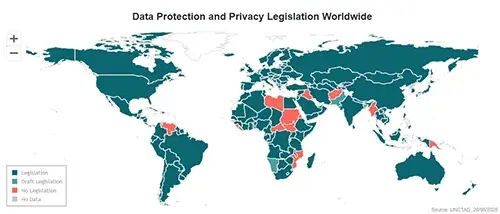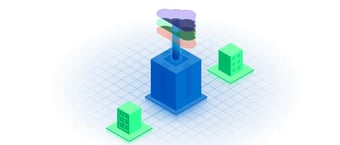
Understanding Data Sovereignty
Welcome to the complex world of data sovereignty – the concept that data is regulated by the laws of the country where it’s generated, stored or processed. And as AI adds volume and value to data, it's more important that companies understand how to stay compliant without slowing down business.
Where your data “lives” has always been important. The thing is, data doesn’t sit still – it moves across borders, through clouds, between continents — carrying everything from customer identities to AI model training sets and inferences. Another thing is that while data has gone global, the rules that govern it have stayed regional.

What is Data Sovereignty?
Data sovereignty refers to a country or jurisdiction’s laws and governance structures that apply to data. In practice, a government regulates how data is collected, stored, processed and shared within its borders in an effort to protect the privacy of its citizens or local entities.
To understand data sovereignty, it helps to unpack a few related concepts:
- Data residency is simply about where your data is housed. Businesses often choose storage locations based on compliance with certain legal requirements, tax benefits or performance.
- Data localization refers to laws that require certain types of data, often financial, health or personal, to be kept and processed within national borders.
- Data sovereignty is about the authority of countries to govern the data generated and stored in its territory.
Here’s the distinction: Data residency is a business decision about where to store data; data localization is about legal boundaries; and data sovereignty is about jurisdiction and control. In today’s hyper-connected world, data may travel freely, but legal oversight does not. Knowing where your data resides means it’s essential to know what rules apply.
The Importance of Data Sovereignty
As businesses expand globally, where data lands matters as much as where it came from. Once data is stored within a country’s borders, it becomes subject to that jurisdiction’s legal framework, regardless of where the company is headquartered.
A U.S.-based company that collects data from its users in the EU, for example, must comply with the GDPR (General Data Protection Regulation) and may face restriction on cross-border data transfers. Some regulations require companies to keep a local copy of data, limit access by foreign entities or prevent insights derived using local data from being exported. Some governments reserve the right to access data stored on their soil, with or without notice. Also, storing data in one country doesn’t insulate it from legal obligations elsewhere. Overlapping regulations, contractual agreements and national laws all can apply.
The stakes are high: Companies must comply with data laws and implement safeguards to avoid serious consequences. For example, as of March 2025, a total of 2,245 fines have been recorded for GDPR violations, amounting to approximately 5.65 billion Euros.2 The financial hit is only part of the risk. Service disruptions, legal exposure and reputational damage can follow close behind. In a world where trust is currency, mishandling data isn’t just a mistake — it’s a liability.
Enterprises, Infrastructure and Data Sovereignty
Data sovereignty is fundamentally about control. Colocation offers enterprises powerful control by allowing them to house their own equipment within a secure data center. Importantly, the data remains completely isolated on your own equipment and accessible only to authorized personnel, whether remotely or on-site.
Infrastructure choices matter. Colocation offers a flexible approach where sensitive data can be kept while still allowing connections to public cloud providers. Some select, carrier-neutral colocation data centers provide direct, low-latency links to major clouds, helping businesses avoid vendor lock-in and maintain sovereignty over data location and access.
Most importantly, other than in the case of managed service providers, the data center provider does not manage or access your data, which is critical for meeting strict data sovereignty requirements. With colocation, your data stays on your equipment and under your control.
With data sovereignty laws tightening and compliance risks growing, companies need transparency and control over their entire data infrastructure. Colocation delivers on these demands by combining physical security, operational flexibility, and regulatory compliance — making it a smart choice in today’s complex landscape.
Know More
Contact CoreSite to learn more about how colocation data centers can help you address data sovereignty and other infrastructure compliance requirements.
%20copy.webp)
References
1. Data protection and privacy legislation worldwide (UNCTAD)
2. GDPR Enforcement Tracker Report 2025 (CMS)










